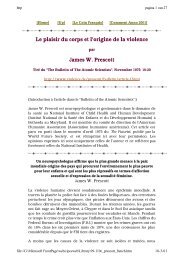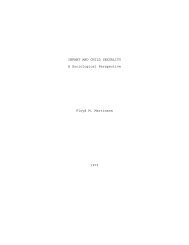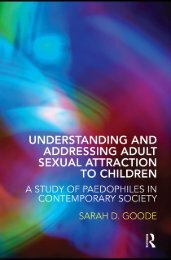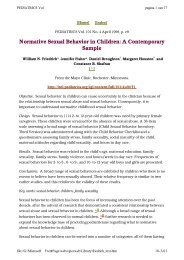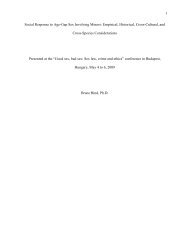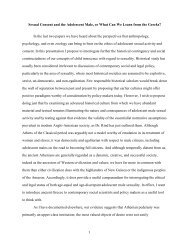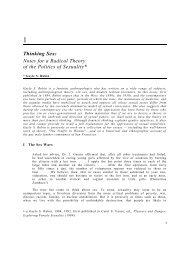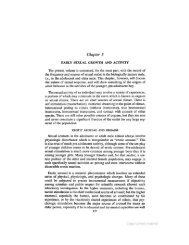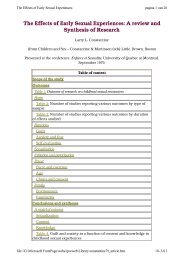PDF file - Ipce
PDF file - Ipce
PDF file - Ipce
Create successful ePaper yourself
Turn your PDF publications into a flip-book with our unique Google optimized e-Paper software.
Part_5_2<br />
character concerned only with trivial things or whose minds are easily turned. I am not saying<br />
we should do the same. All kids need love and affection, especially perhaps some of the socalled<br />
weak or troubled kids at whom Pausanius would turn up his nose. But if we are really to<br />
respect kids as humans, as free moral agents, that does mean being critical of them, it does<br />
mean making judgments about what's good and bad in them -- just as some of them, it seems,<br />
are very ready to be critical of us. It is not "respecting" youngsters to treat them uniformly just<br />
as potential "victims".<br />
Love in our society<br />
And if we do think in this way, where do we stop? Do we wait for a perfect society before<br />
physical contact is OK? How much risk is too much? What about the man-boy relationships<br />
described in Theo Sandfort's research of two decades ago? Those consenting relationships<br />
seemed beneficial to the youngsters at the time by rigorous scientific standards. But society has<br />
changed. Some of those boys may now say they regret what happened. Does this mean that all<br />
those years ago, in a more liberal climate, the men should have refrained from sex because of<br />
the risk that society might become more conservative?<br />
And what about Randy's point? Even non-sexual closeness can end in tears and trauma. An old<br />
friend of mine, not a paedophile, told me many years back of such a case. It was when he was a<br />
student and had spent his long summer holiday with a family in a remote cottage. He and the<br />
young boy of the household spent a lot of time together. They both loved fishing and went out<br />
on long expeditions together. Nothing sexual in it at all. But the boy became attached to him in<br />
a way he had not anticipated. When the time came for parting the child was not just sad, he<br />
was inconsolably upset and tearful to an extent my friend found disturbing. Should he never<br />
have allowed that friendship to grow? Should he have shunned the boy from the start and told<br />
him to stay at home with his mother?<br />
The logic of always avoiding potential harm would suggest exactly that. But what would the<br />
boy have thought of such a policy? I am reminded of the poet Alfred Tennyson, deep in<br />
profound grief over the death of his friend Arthur Henry Hallam. His view, famously, was that<br />
despite his grief and pain "It is better to have loved and lost than never to have loved at all".<br />
In another interesting case, a woman came to a conclusion very close to the heart of the matter.<br />
Some of you will remember it as coming from the interview with a woman named as Heidi,<br />
published in the Special Women's Issue of the journal Paidika. Heidi tells us she had been 13<br />
when she had had a romantic friendship with one of her teachers. The pair were in love. They<br />
hugged and kissed and spent time together. There was no sex but the relationship was risky.<br />
Heidi said: "I needed someone to trust, someone who did not treat me as a child. It's easy to fall<br />
in love with someone who gives you that. She was also willing to take a big risk because of me.<br />
I was a minor, a girl, a student. It was all forbidden. Her taking a risk for me also made me<br />
trust her. It made her special. She thought I was important enough to take such a big risk."<br />
http://home.wanadoo.nl/ipce/newsletters/nl_e_12/part_5_2.htm (9 of 13) [10/16/2002 5:35:14 PM]



